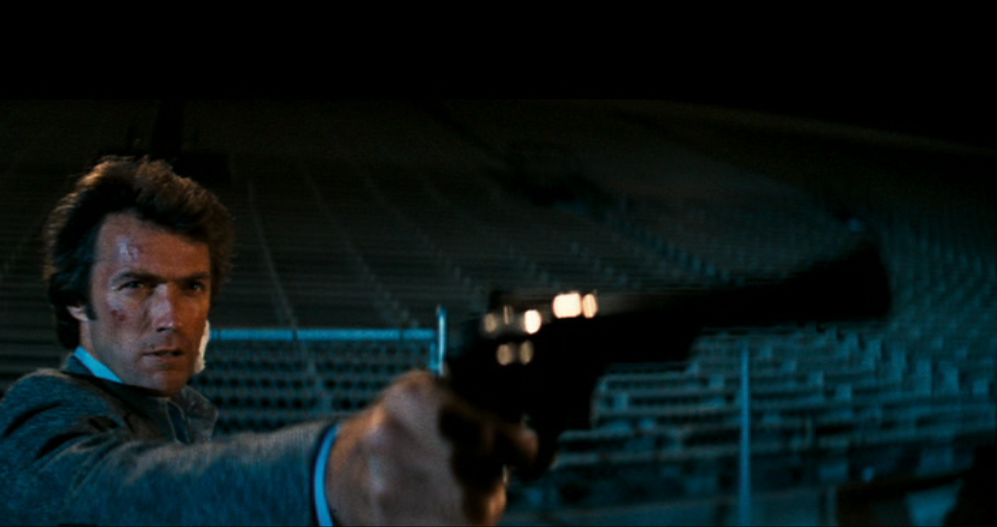Movie Review: Dirty Harry (1971) directed by Don Siegel
Detective Inspector Harry Callahan (Clint Eastwood) of the San Francisco Police Department is not a nice man. He hates everyone equally (or at least that’s what his coworkers say) and has trouble phrasing things politely. In an establishing moment early in the film, Callahan defuses a potential suicide by enraging the man into attacking Callahan instead. He’s known as “Dirty Harry” because whenever the police department has a dirty job, Callahan’s the man to send. Right now, his top priority is catching the “Scorpio Killer” (Andrew Robinson), a sniper who’s demanding money from the city to stop killing.

With one partner dead and another in the hospital, Callahan doesn’t want another partner, but that’s not the way the brass operates, so he’s assigned Hispanic college graduate Chico Martinez (Reni Santoni). As it turns out, sniping from rooftops is something a modern big city police department can shut down pretty well, especially if like the Scorpio Killer, you insist on leaving taunting notes telling them you’re going to do it.
Barely escaping from an ambush by Callahan and Martinez, the Scorpio Killer switches to kidnapping, abducting a teenage girl and burying her with (he claims) a limited supply of oxygen. The mayor (John Vernon) agrees to pay a ransom, and Callahan is assigned as bagman. After running Harry all over town, the killer confesses that he has no intention of releasing the girl alive; he just wanted to also kill a cop. Martinez manages to save Callahan at the cost of being badly wounded himself, and the killer takes a crippling leg wound.
A doctor who treated that wound is able to tell Callahan and his new temporary partner De Giorgio (John Mitchum) where the killer hangs out. On a deadline, the police officers do not wait for a warrant and break into a local stadium. They are able to catch the Scorpio Killer and Callahan is able to extract the girl’s location even as the killer screams that he has “rights.”
As indeed the killer does. Even though the girl is found dead, the District Attorney (Josef Summer) says that due to Callahan’s not having a warrant and having tortured the suspect, he’s forced to toss out all the evidence and the killer will walk free (with a very bad limp.) For the record, the Scorpio Killer could still have been tried for assaulting a police officer (Harry) as Harry hadn’t done anything illegal at that point.
The Scorpio Killer can’t leave well enough alone, and hires a professional to rough him up, framing Callahan for this. And then the killer decides to kidnap a busload of children, leading to the final confrontation.
This movie was part of the vigilante justice fad in fiction, as recent court cases had seemed to give criminals more rights than victims. Thus the killer is entirely unsympathetic and it’s pointed out how unjust his release is. (And the holes in the legal reasoning are ignored because movie.) Dirty Harry is surface cool, and all tough guy who likes to taunt criminals he has at a disadvantage. He does have friends, but only ones who are able to put up with his frequent barbs.
Good use is made of the San Francisco location, and I want to give a special shout-out to supervising hair stylist Jean Burt Reilly for Callahan’s distinctive haircut.
The movie was hugely popular (four sequels!), though Clint Eastwood came to be uncomfortable with the role, and the last sequel The Dead Pool was only agreed to so that Mr. Eastwood could fund a film about jazz. Ronald Reagan loved it, and quoted the tagline “Make my day” at least once.
Content notes: violence, sometimes bloody; brief torture, full female nudity, mention of rape.
Very much a movie worth seeing, but beware falling for the politics.

